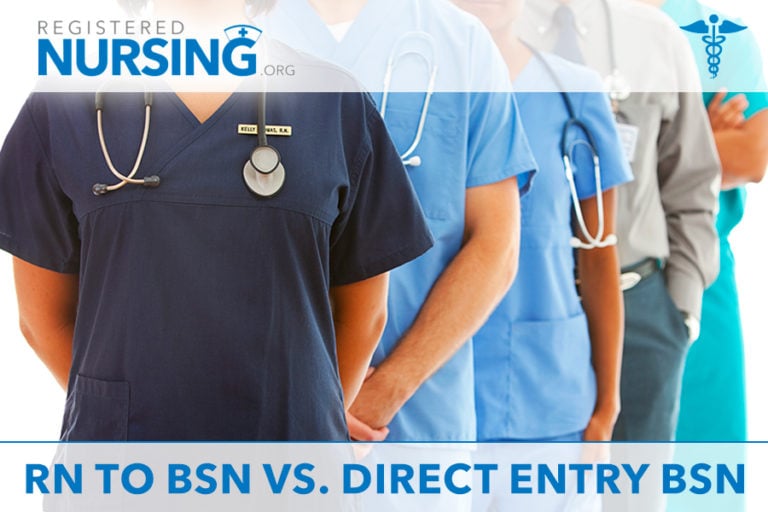RN to BSN vs. Direct-Entry BSN: Which is Best For You?

The path to becoming a registered nurse (RN) is an admirable journey that attracts individuals with a passion for patient care and a commitment to improving healthcare. For aspiring nurses, there are multiple routes to achieve their goals, and two common options are pursuing a Bachelor of Science in Nursing (BSN) degree through either an RN to BSN program or a direct-entry BSN program. Both routes lead to the same RN licensure, but they differ in terms of entry requirements, educational pathways, and the overall learning experience. In this article, we will explore the key differences and advantages of RN to BSN and direct-entry BSN programs, helping you make an informed decision about which path is better suited for your nursing career aspirations.
Comparison of Direct-Entry BSN programs and RN to BSN Programs
| Direct-Entry BSN Programs | RN to BSN Programs | |
| Geared Towards | Individuals without prior nursing experience | Registered Nurses (RNs) with an associate degree or diploma |
| Duration | 3-4 years full-time | 1-2 years part-time or full-time |
| Prerequisites | High school diploma or equivalent, prerequisite courses in biology, chemistry, and anatomy | Active RN license, completion of an associate degree or diploma in nursing |
| Curriculum Focus | Comprehensive nursing education covering theory, lab, and clinical experiences from the ground up | Advanced nursing concepts, leadership, research, and specialized courses |
| Clinical Hours | Extensive clinical rotations included as part of the program | May require fewer clinical hours, sometimes completed online |
| Program Outcome | Prepares students to take the NCLEX-RN exam for initial licensure as an RN | Enhances knowledge and skills, leading to a Bachelor of Science in Nursing (BSN) |
| Cost | Typically higher due to longer duration and more comprehensive education | Generally lower than direct-entry BSN programs, often with flexible tuition options |
RN to BSN Programs
RN to BSN programs are designed for registered nurses who have already completed an associate’s degree in nursing (ADN) or have earned their RN diploma through a hospital-based program. These programs offer a streamlined path for RNs to further their education and obtain a BSN degree. They are often structured to accommodate the busy schedules of working nurses, with flexible online or part-time options.
Advantages
- Career Advancement: RN to BSN programs open doors to career advancement opportunities. Many healthcare facilities prefer or require RNs to have a BSN for leadership, management, and specialized nursing practice roles.
- Higher Earning Potential: BSN-prepared nurses often command higher salaries than those with ADN degrees. A BSN can translate into increased earning potential throughout your nursing career.
- Wider Scope of Practice: BSN-educated nurses have a broader knowledge base, enhancing their ability to provide comprehensive patient care and assume roles in critical care, public health, and community health.
- Flexibility: RN to BSN programs are designed with the working nurse in mind, offering flexible scheduling options, including online coursework and part-time study.
- Career Transition: RNs who wish to transition to a different nursing specialty or explore research, education, or healthcare administration opportunities can benefit from the additional education a BSN program provides.
Considerations
- Time Commitment: RN to BSN programs typically take one to two years to complete, depending on whether you enroll full-time or part-time. This means additional time spent in school while working as an RN.
- Prerequisites: As stated previously, RN to BSN programs are only open to those who have already completed an ADN degree or nursing diploma program, meaning it’s not the most direct or streamlined pathway to a BSN degree.
- Cost: Tuition costs can vary widely — anywhere from $10,000 to $30,000 or higher, so it’s essential to consider the financial aspect of returning to school. However, the potential for higher earning potential with a BSN degree can offset this investment.
- Balancing Work and Education: Juggling work responsibilities with academic commitments can be challenging, so time management and support from your employer and family are crucial.
Direct-Entry BSN Programs
Direct-entry BSN programs, also known as traditional BSN programs, are designed for individuals new to nursing who do not hold an RN license. These programs provide comprehensive nursing education, including classroom instruction, hands-on clinical experiences, and simulations. Upon completion, graduates can sit for the NCLEX-RN exam to obtain their RN licensure.
Advantages
- Comprehensive Education: Direct-entry BSN programs provide a thorough foundation in nursing, including theoretical knowledge and practical skills, making them suitable for individuals new to the field.
- Streamlined Path: For those who know from the outset that they want to pursue a BSN and become an RN, direct-entry programs offer a transparent and efficient route to achieve this goal.
- Clinical Exposure: These programs typically include extensive clinical rotations, allowing students to gain real-world experience in various healthcare settings.
- Diverse Career Options: Graduates of direct-entry BSN programs have a wide range of career options, from bedside nursing to specialized practice, advanced degrees, and leadership roles.
- Networking: Being part of a cohort in a direct-entry BSN program allows students to build a strong professional network with peers and faculty from the start.
Considerations
- Entry Requirements: Direct-entry BSN programs have competitive admission requirements, including prerequisites, standardized tests (e.g., the TEAS or HESI), and a competitive GPA. Meeting these requirements can be challenging.
- Program Duration: Traditional BSN programs usually take four years to complete, similar to a bachelor’s degree in any other field. This means a more extended time in school compared to RN to BSN programs.
- Cost: Tuition and fees for a traditional BSN program can be significant — sometimes upwards of $40,000 or higher, and students must consider the financial aspect carefully.
- Limited Options for Current RNs: If you are already an RN with an ADN or diploma, pursuing a direct-entry BSN may not be the most efficient route to further your education, as it repeats much of the coursework you have already completed.
Which Path is Best for You?
The choice between RN to BSN and direct-entry BSN programs depends on your circumstances, career goals, and preferences. Here are some factors to consider when making your decision:
Choose RN to BSN If:
- You are already a licensed RN with an ADN or diploma and want to advance your career.
- You need flexibility in your education to balance work and family commitments.
- Your primary goal is career advancement, higher earning potential, or specialization in nursing.
- You prefer a shorter program duration compared to a traditional four-year BSN program.
- You value the convenience of online or part-time study options.
Choose Direct-Entry BSN If:
- You are new to nursing and aspire to become an RN with a BSN.
- You have met the admission requirements, including prerequisites and standardized tests.
- You seek a comprehensive nursing education that includes clinical rotations and simulations.
- Networking and building relationships with peers from the beginning of your nursing education are essential to you.
- You are willing to commit to a four-year program and are prepared for the associated financial costs.
Ultimately, the “better” choice between an RN to BSN and an accelerated BSN program depends on your individual goals, circumstances, and where you are in your nursing journey. Both paths lead to rewarding careers in nursing, and the right choice is the one that aligns most closely with your aspirations and needs. Regardless of your decision, remember that the field of nursing offers a wealth of opportunities for professional growth and positively impacting patient care and healthcare systems.
Latest Articles & Guides
One of the keys to success as a registered nurse is embracing lifelong learning. Our articles and guides address hot topics and current events in nursing, from education to career mobility and beyond. No matter where you are on your nursing journey, there’s an article to help you build your knowledge base.
Browse our latest articles, curated specifically for modern nurses.



